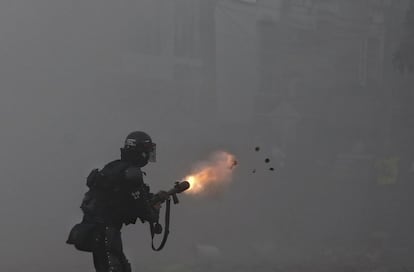Colombia: Uribism’s final hours
Recent events at street level have delivered a blow to the electoral future of the ideological movement created by former president Álvaro Uribe

In the middle of the protests, of the degradation, of the human rights abuses, the Colombian government has withdrawn the tax reform that made the cup of indignation spill over, and is now beginning a search for a path towards consensus, agreement and “spaces to listen.” There can be no other way forward for now, in addition to finding within the many proposals that have been made, a sensible technical text that will solve the numerous economic needs the country faces. But that’s not the core issue here. And the core issue needs to be brought into the light, or else, like all recurring forms of violence, the eruption will not be contained.
“We are gente de bien,” said President Iván Duque in an address on the seventh day of protests in Colombia, where access in and out of many cities has been compromised while food and oxygen supplies are running low due to road blockades by angry protesters from several sectors. It is not easy to know what he means by a term that could be defined as honorable or upstanding citizens. Honorable people acknowledge their mistakes, and punish those who abuse other people’s rights instead of applauding them.
But let’s break this down, because in this sea of violence on either side, there are several explanations for what’s happening, as well as consequences. One of them is that Uribismo is facing its final hours. It is the street that’s delivering the blow to its permanence in the electoral scene. The president of the republic does not believe that it is exemplary citizens, people who are going hungry and who have needs, who are doing the talking; instead he believes the violence is hiding behind political justifications, although he hasn’t mentioned any names; his sentences are incomplete or maybe he is just afraid of pointing the finger because he doesn’t really know who these violent individuals are. And if he does know, he is opting to talk sideways instead of saying things up front.
The voices offering to serve in times of crisis – many of which contributed to the same – are failing to understand that Colombia is dealing with a very complex situation right now
And it’s important to say that he’s wrong, because real solutions will depend on his approach. The protests are against his government, and they are a call to account that was a long time coming, triggered by the decision to violate territorial peace, by the Democratic Center’s confrontational rhetoric and refusal to acknowledge the victims of past and present violence, and by its political construction aimed at preventing the distribution of land, except that the party’s financial backers at the time have been unable to retain their hold on this land, which is now under the control of other criminal drug gangs.
This is the reason why Duque’s political rhetoric tries to put everyone in the same bag – the anarchists and the violent groups with the taxi drivers, the store owners, the students and the truck drivers, the latter being considered upstanding citizens. To differentiate between the motives would entail admitting that this new protest began after the murder of Javier Ordóñez by a police officer in September, and that a reform of the police never got underway. It would mean admitting that there is no government awareness that they reached power in a country that was deeply fractured following the peace accord with the FARC guerrilla and in need of greater leadership to help heal the wounds.
The Inter-American Commission on Human Rights (IACHR) has made clear what the state’s international obligations are regarding domestic security and inter-American standards that set out the tasks of the armed forces. It must be extraordinary, regulated, supervised and subordinate. It is not a minor issue that the United Nations, the US State Department, the US Congress and the European Union all expressed themselves on the same day regarding what they described as a brutal and excessive crackdown on protesters. There is something called proportionality, and authorities in charge of responding to the protests should be familiar with this concept.
And why is it important to set the record straight at this particular point in time? Because if we newsroom workers, who are currently working from home because of the pandemic, report on youths killed by the police without uncovering the faces and the identities of the human rights abusers, then we will not have achieved anything.
If we are also not capable of saying that violence with long-range weapons is being exercised by an amalgam of looters, National Liberation Army (ELN) militias, dissidents and other criminals from the arms and drug trafficking worlds, while demanding evidence of the same from those making the claims, then we are feeding the narrative of the defense minister, who holds that all this is a criminal political plot. Our job is to question him over the abuses committed by men under his authority, and the reasons why the criminal actions are able to destabilize everything while law enforcement is unable to prevent it.
The voices offering to serve in times of crisis – many of which contributed to the same – are failing to understand that Colombia is dealing with a very complex situation right now. As the journalist María Alejandra Villamizar said, it is the result “of an embellished democracy in a country that, like so many others in Latin America, is not providing a real answer to people’s problems, where very little politics, real politics, is being conducted.” One need only take a look at El Salvador under Nayib Bukele to understand what she means.
And if the message has not been understood by the champions of Uribism – whose more radical grassroots failed to stand behind their own president, highlighting his inabilities, by Congress and its meager efforts in favor of the people with a few exceptions, courts that are co-opted by whichever administration happens to be in power, and political parties that include [the progressive] Humane Colombia with its new permissive attitude towards cronyism, as well as [the center-right] Radical Change, the liberals and all the various nuances – then they will have to understand that the country has been set on fire by all of them as well.
Those spaces that Iván Duque announced to listen to the citizens represent an abstract scenario, unless they take place with social organizations and social leaders. And that means recognizing them as valid interlocutors, as honorable people. He cannot keep offering a country with a future if he is unable to recognize the past, the conflict, and if he does not come out of his autistic present, because if one thing is certain, it is that for Uribism at least, there are no more opportunities in Colombia. Neither can the parties of the so-called Coalition of Hope set the conditions for dialogue when this dialogue must produce a modicum of humanitarian agreements so that oxygen will reach the hospitals where nearly 500 Colombians are dying each day of Covid-19. This is not the right time for conditions and deadlines.
Don’t ask us for more indifference. It is you, the people in government, who must achieve calm while we investigate the reasons for state inaction, who the vandals are, who benefits from these events, how we can respond with the truth to information that will serve the people in the middle of this national pain.
English version by Susana Urra.
Tu suscripción se está usando en otro dispositivo
¿Quieres añadir otro usuario a tu suscripción?
Si continúas leyendo en este dispositivo, no se podrá leer en el otro.
FlechaTu suscripción se está usando en otro dispositivo y solo puedes acceder a EL PAÍS desde un dispositivo a la vez.
Si quieres compartir tu cuenta, cambia tu suscripción a la modalidad Premium, así podrás añadir otro usuario. Cada uno accederá con su propia cuenta de email, lo que os permitirá personalizar vuestra experiencia en EL PAÍS.
¿Tienes una suscripción de empresa? Accede aquí para contratar más cuentas.
En el caso de no saber quién está usando tu cuenta, te recomendamos cambiar tu contraseña aquí.
Si decides continuar compartiendo tu cuenta, este mensaje se mostrará en tu dispositivo y en el de la otra persona que está usando tu cuenta de forma indefinida, afectando a tu experiencia de lectura. Puedes consultar aquí los términos y condiciones de la suscripción digital.









































